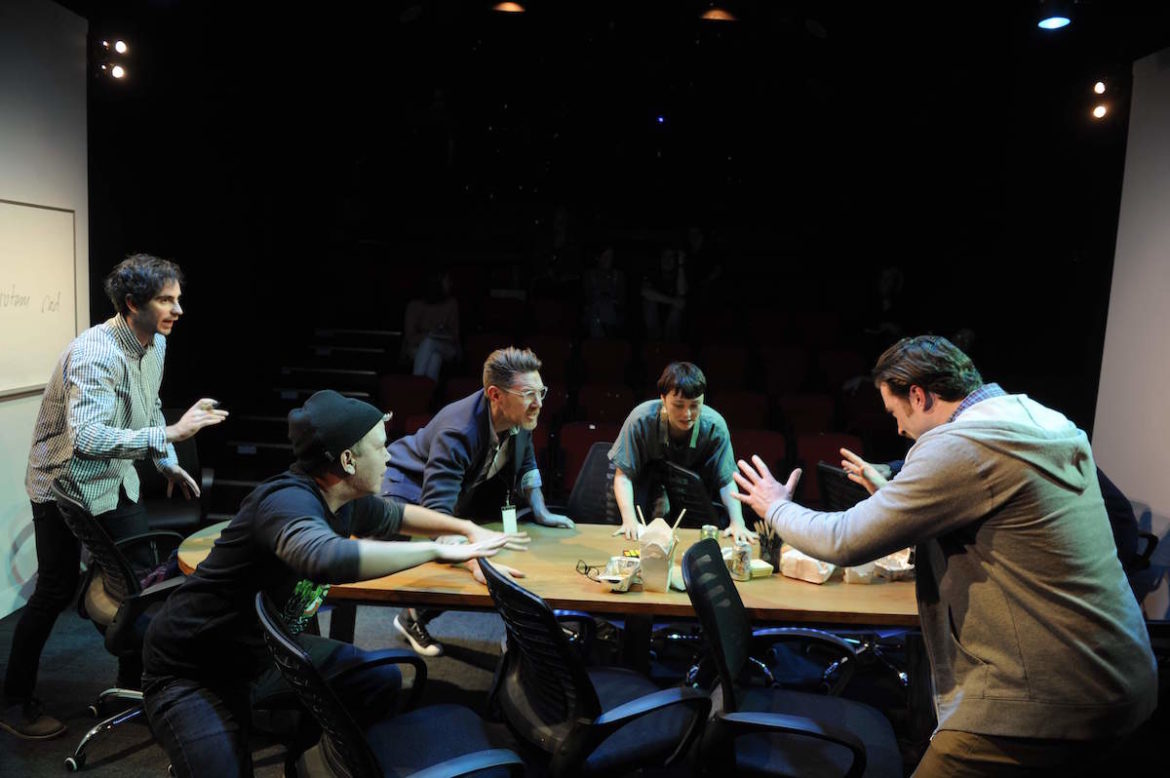Robert Reid reviews Annie Baker’s The Antipodes and tumbles into a chaotic vision of creation.
Bad magic in the writers’ room.
In Annie Baker’s The Antipodes, now at Red Stitch, screenwriters sit around a table and pitch ideas on monsters and the monstrous. We never quite get to what the monstrous is, but they talk around it a lot. There’s only one woman in the room, Eleanor (Ngaire Dawn Fair) which, I’m given to understand, is not unusual for a professional writers’ room.
Fishing for stories, the old man at the head of the table, Sandy (Jim Daly) calls for the writers to share their memories: things like the loss of virginity, the worst moment of their life, their biggest regret. They skip forward through time, flicking forward with the lights still on, in what feel like unconscious blackouts.They write together for weeks this way. It creates a sense of discontinuity to their conversation, highlighting the social, ambitious and strategic absurdity of creative humans.
Besides Eleanor, there is one other woman in this world: Sarah (Edwina Samuels). She brings coffee and takes calls and changes clothes – once, memorably, three times in a single sentence. She makes excuses for the old man, for the room’s failure to gel and be brilliant. She’s the messenger to the Greek chorus of screenwriters, bringing them threats from their bosses, the producers. These are shadowy men with power who are only heard once, on a conference call with a bad line. It’s an ominously cheery conversation. The room already knows they have nothing.
Danny M2 (George Lingard) tells his stories reluctantly, admitting that he feels awkward doing so. He says that although the stories are true, they feel made up when he relates them to the group. No one responds and Sandy leaves. Sarah comes in to invite DannyM2 to leave the room and speak to Sandy in his office. We know already, from the horror-struck silences and faces, that we’ll never see Danny M2 again. And we don’t.
These epic silences and oversharings into the void remind me of old-fashioned absurdist theatre. Baker’s play contrasts moments of surreal poetry and other literary modes of address and performance writing with the banal procedures of the screen writers’ world, ordering takeaway dinner and pitching taglines and premises.
The stories that tumble out as the writers struggle towards a project pitch are mythic. They’re narratives of sex and death, of nightmare and creation. The screenwriters, producers and show runners are like the thousands of oral poets whom we know as Homer. Each writers’ room conjures ancient gods by passing around the same seven (18, 31) stories, each of them spit-shining their own version, trying to polish a turd.
They share their stories as campfire musings on horror and the bizarre. Sarah talks about her month-long incarceration in the witch’s house at the end of her childhood lane, a house with a fence of with skulls and bones, as though she were relating a mix-up getting coffee. Adam (Dushan Philips) lets a bizarre myth about the birth of the first story tumble out of him, speaking with a rhythm so hypnotic and imagery so bizarre, that the audience starts when Eleanor yells that no one is transcribing the story.
But what is this play? Musings on the muse? Theatre about theatre? Like Baker’s earlier work Circle Mirror Transformation, The Antipodes takes the mechanics of show business and turns them into metaphors. Of what? In Circle Mirror Transformation the impro theatre exercises allow us into the lives of the characters outside the rehearsal room. We make an emotional connection to them through the games they play. The screenwriters in The Antipodes remain mysteries and the mechanics of the screenwriting game fall apart to reveal a chaos-magic vision of writing itself.
Well, okay.
I wonder about the title. I suppose that the writers bounce between the antipodes of sex and death. The stories of sex and death come thick and fast at the beginning as the “get to know” you games of corporate introductions make awkward people manifest their various neurotic responses to social situations. But soon this devolves into nonsense: digressions into the circularity of time and magic drawings on the whiteboard. (A serpent growing out of horizontal time growing from a tree like a wave length that becomes the solar system shaped like ChaosStar which hides the three wise monkeys…I don’t know if they do the same drawings every night but the night I saw it, this whiteboard be trippin’).
In semi-darkness, the desperate screenwriters create a sigil to help them find the right story. They chant the nonsense phrase around the table, with no idea what gods they’re invoking. I’m reminded of the bacchanal scene in the movie Hard Core Logo. Late at night, while most people are asleep, is when the real magic, the blood magic, comes out. When the party reaches its gone-too-far point.
A creation myth is birthed, and then the production company shuts down the project.
But magic has consequences. One more and salut, says Joe Dick at the end of Hard Core Logo: and then he blows his brains out over the pavement and the documentary film crew. The Antipodes cuts to black before the screenwriters pay the price for their magic. If the closure of the project is the price, it feels like chump change.
The Antipodes is a strange ritual made of variety clippings and DVD directors commentaries. It’s almost Beckettian in its infuriating insistence on nothing. The rituals of La La Land worked to no purpose. Hollywood eating itself.
And…..?
The Antipodes by Annie Baker, directed by Ella Caldwell. Set and Costume Design by Chloe Greaves, Lighting Design by Clare Springett and Bronywn Pringle, Sound Design by Daniel Nixon. Performed by Ngaire Dawn Fair, Casey Filips, Darcy Kent, Ben Prendergast, Harvey Zielinski, Jim Daly, George Lingard, Dushan Philips and Edwina Samuels. At Red Stitch until 12 August.
Red Stitch has no access information available.

